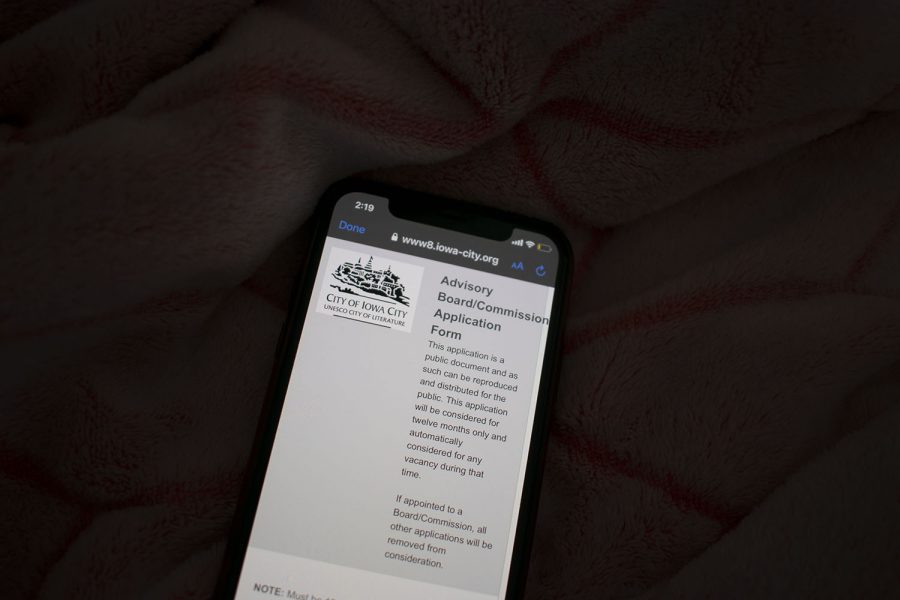New Iowa City ordinance prohibiting biased policing passed first of three votes by city council
The ordinance, which will explicitly add the prohibition of biased policing and racial profiling to the City Code, will need to pass two more council votes before becoming law.
Photo Illustration by Raquele Decker.
November 18, 2020
Iowa City is taking the steps to codify its commitment to unbiased policing and prohibiting racial profiling.
The Iowa City City Council voted unanimously in favor of a new city ordinance that would explicitly prohibit the Iowa City Police Department from performing biased policing and racial profiling within the city.
The ordinance was created in collaboration with the Iowa-Nebraska NAACP, who provided the city with the template for the ordinance.
In June 2020, the city council announced its commitment to address systemic racism within city government. City Manager Geoff Fruin said in a memo to the city council that while the police department have had longstanding policies prohibiting biased policing and racial profiling, there is currently nothing in the City Code expressly prohibiting these practices.
“The ordinance requires employees to articulate reasonable suspicion and probable cause and prohibits uses of language that is derogatory, tends to belittle, show contempt for or defame any individual demographic,” Fruin wrote in the memo.
Fruin said the end goal is to make this language a part of Iowa code.
Fruin said the city ordinance would define biased policing as, “differential treatment in the performance of law enforcement duties or delivery of police services towards a person or classes of persons when one or more individual demographics was a motivating factor in the action taken.”
Racial profiling would be definied as “a form of biased policing where a motivating factor of the action taken is based on an individual’s race, color, ethnicity, religion or national origin rather than on the individual’s behavior.”
The city council will vote on the ordinance two more times before it becomes law.
Iowa City resident David Drustrup, a supporter of the Iowa Freedom Riders, said during public comment he believes the ordinance offers no real change to the police department.
“I really hope the council does not see this as some meaningful move forward,” Drustrup said. “Reading through all this, it’s completely devoid of any substance or meaningful change. It looks like it was authored by the police department and dressed up as progress.”
Mayor Bruce Teague said he was thankful for the work that the NAACP Iowa-Nebraska Chapter and its president Betty Andrews has done to create the ordinance.
“This is not the endgame, but I believe it gives us something to lead on when it comes to making an ordinance and not just having it in our policies,” Teague said. “Individual change is most important, when we are looking at policing. Individuals that are on the front line, that are being involved with people’s everyday lives. I really believe that whoever responds, making sure these unbiased policing acts is moving us in the direction we want our city to be in.”
On Nov. 10, the Coralville City Council also approved the first consideration of a similar ordinance to address biased policing in Coralville. The ordinance for Coralville was created with assistance from the NAACP too.
City Councilors Mazahir Salih and Janice Weiner said although there is a lot of work to be done moving forward, it is a necessary building block to further addressing systemic racism.
Andrews said the city ordinance is the result of many years of work the NAACP has done with collecting and analyzing national data. She said creating the ordinance held a personal meaning for her.
“I suffered the tragedy of losing my nephew at the hands of police in Washington when he was walking down the street,” he said. “When I see this type of reform coming through Iowa City, just immediately after having a similar ordinance in Coralville and of course, Des Moines, and to work to place a law at the state level…we are continuing to work with you and others to move towards a better Iowa.”
Truth And Reconciliation Commission
The city council also appointed nine commissioners to the Truth and Reconciliation Commission on Tuesday. Eric Harris, Kevin John Rivera, Mohamed Traore, Anthony Currin, Amel Ali, Raneem Hamad, T’Shailyn Harrington, Layana Navarre-Jackson, and Johnson County Supervisor Royceann Porter will serve as commissioners until June 30, 2022.
Twenty-six people applied to be appointed to the commission. Johnson County residency was required and Iowa City residency preferred for applicants.
The commissioners will be tasked with bearing witness to the truth of racial injustice and carry out restorative justice through public hearings and testimony, according to the city’s position vacancy announcement.






